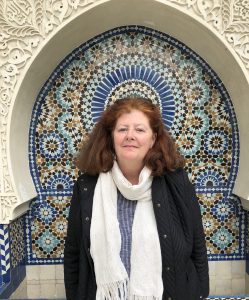Areas of specialization: Islam and popular culture, ajami writing of African languages, Sufi discourse, Sahel (Senegal, Mali, Mauritania, Niger), Morocco, West Africa.
Fiona McLaughlin holds a joint appointment in the Department of Linguistics, where she serves as Chair, and the Department of Languages, Literatures and Cultures. She is an affiliate faculty member of the Center for African Studies and a member of the Sahel Research Group and the Center for Global Islamic Studies. McLaughlin has a Ph.D.in Linguistics from the University of Texas at Austin. In addition to her work on the phonology, morphology and sociolinguistics of the Atlantic languages of West Africa, she is interested in various aspects of writing, discourse, and popular culture in the Muslim societies of the Sahel.
In addition to her work on the phonology and morphology of the Atlantic languages of West Africa, McLaughlin’s research interests include language contact in urban Africa; the sociolinguistics of writing, and particularly ajami (Arabic script) writing of West African languages; Sufi discourse; and Islam and popular culture, especially popular music, in Senegal. She has extensive field experience in West Africa and has taught at the Université Abdou Moumouni in Niamey, Niger as a Fulbright professor, and the Université Gaston Berger in Saint-Louis, Senegal. Her research has been funded by fellowships from the National Endowment for the Humanities, the American Council of Learned Societies, and Fulbright, as well as numerous internal grants from the University of Florida (FEO, Office of Research, Humanities Enhancement Fund, Center for International Business Education and Research, and the Center for African Studies). She is a former director of the West Africa Research Center in Dakar, Senegal and recently held a Fulbright Regional Research Fellowship for fieldwork on urban language contact.
At the University of Florida McLaughlin has taught Islam and Popular Culture in Africa, and Islam and African Literature. She has language expertise in Wolof, Pulaar, Seereer, and French.
Selected Publications
Articles and book chapters:
- Fiona McLaughlin, 2012. “Religious authority and Wolof discourse on clandestine migration to the Canary Islands.” In Eric Ross, Fatima Harrak and Souad Anegay, eds. Religion et migration. (Rabat: Institut des Études Africaines, Université Mohammed V- Souissi) pp. 235-249.
- Fiona McLaughlin, 2011. “Youssou N’Dour’s Sant Yàlla/Egypt: A musical experiment in Sufi modernity.” Popular Music 30(1):71-87.
- Fiona McLaughlin, with Leonardo Villalón, 2011. “Mettre en scene la légitimité: analyse d’un discours de feu Xalifa Abdoul Aziz Sy et de son jottalikat.” In Communication wolof et société sénégalaise. Sascha Kesseler, Anna Diagne, and Christian Meyer, eds. (Paris: L’Harmattan) pp.323-344.
- Fiona McLaughlin with Babacar Mboup, 2010. “Mediation and the performance of religious authority in Senegal.” Islamic Africa 1(1):39-61.
- Fiona McLaughlin, 2000. “‘In the name of God I will sing again, Mawdo Malik the good’: Popular music and the Senegalese Sufi tariqas.” Journal of Religion in Africa 30(2):191-207.
- Fiona McLaughlin, 1997. “Islam and popular music in Senegal: The emergence of a ‘new tradition.’” Africa 67(4):560-581. (Journal of the International African Institute, London).
Research
Ajami literacy in Senegal
This project is part of a larger research focus on vernacular literacy in the Sahel and explores multiple facets of ajami writing in Senegal. Ajami refers to the writing of a language other than Arabic in the Arabic script and is a widespread phenomenon in many Muslim societies (Urdu and Farsi, for example, are written in the Arabic script in Pakistan and Iran, respectively). In Senegal, where basic literacy is often acquired in Qur’anic schools, there is a longstanding history of writing local languages such as Wolof, Pulaar, and Mandinka in the Arabic script. Ajami Wolof, known locally as wolofal, in particular, is highly visible in the written environment, even outside religious centers such as Touba. This project investigates ajami writing from the theoretical perspective of Blommaert’s (2008) work on grassroots literacy and focuses on the ways in which local literacy practices develop outside of established regimes of literacy. I presented a first paper on the topic, entitled “Grassroots literacy at the port of Niodior (Senegal)” at a workshop on the Arabic script in Africa at the Université Libre de Bruxelles in April 2013. This paper takes a first look at ajami writing in the Seereer language.
Linguistic warscapes of northern Mali
This project is part of a larger research focus on vernacular literacy in the Sahel, and falls within the purview of the emerging field of linguistic landscape, or writing in public space. Here I examine the graphic environment of northern Mali during the political crisis that started in 2012 when a Tuareg liberationsist movement and a coalition of jihadist groups vied for control over the northern part of the country as the Bamako government fell into disarray punctuated by a military coup d’état. The time period of this research continues up to the French-led military intervention of January 2013. My principal interest here is to understand the uses to which public writing (grafitti, billboards, banners, writing on vehicles and clothing, etc.) is put in times of war, and how such writing contributes to symbolic control over territory, people, and ideas. The warscapes of northern Mali are linguistically complex. They are written in multiple languages, primarily Arabic, French and Tamasheq, and involve three scripts, Arabic, Latin and Tifinagh, each of which is associated with a number of ideological stances. I first presented work on this topic at the Linguistic Landscapes 6 conference in Cape Town, South Africa, in April 2014.
